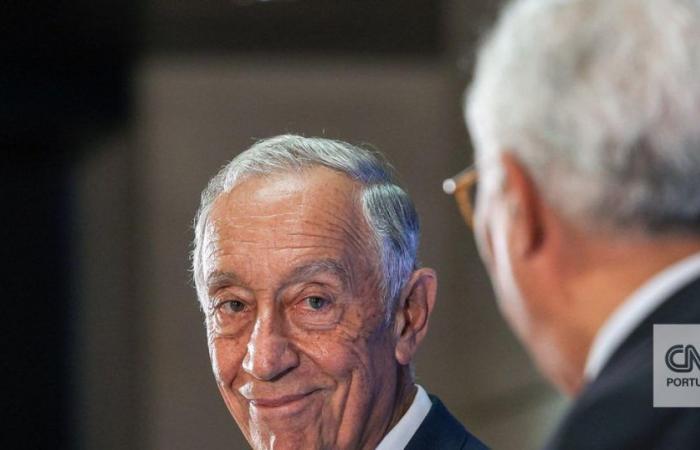The President of the Republic ended the “good institutional relationship” he maintained with António Costa as Prime Minister, who is now leaving office. “This does not mean that this is the last time that we will find ourselves at these crossroads in the service of Portugal”, he stressed, leaving the future of the outgoing prime minister open, at a time when António Costa’s name has been suggested for the presidency of the European Council
“Cooperation”, “institutional solidarity” and “national solidarity”. This is how Marcelo Rebelo de Sousa and António Costa describe the last eight years of a relationship in which they were not always in agreement, but in which “there was always a good institutional relationship”. “And this should be the case, as much as possible, for the relationship between head of State and head of Government”, highlighted the President of the Republic, opening space to meet António Costa again “at other crossroads in the service of Portugal”.
“So, Prime Minister, this does not mean that this is the last time that we will find ourselves at these crossroads in the service of Portugal. It is the last time that we will be in these circumstances, performing these functions (…). The world does not It ends today, life doesn’t end today, and this means that we are both in full health. There is no reason why we shouldn’t find ourselves at other crossroads also thinking about Portugal”, declared the President of the Republic, in a joint press conference with António Costa, after presiding over the last Council of Ministers, at the invitation of the outgoing prime minister.
António Costa did so not only “out of courtesy”, but also to “emphasize the importance of institutional cooperation, institutional solidarity” which he says marked the relations between the Palaces of Belém and São Bento.
This is “the last time” that both will “publicly participate in a ceremony”, says the outgoing prime minister. And they did so in the new Government building, in the former Caixa Geral de Depósitos facilities – one of the legacies that António Costa leaves to the next Prime Minister, Luís Montenegro, and which he made a point of making very clear in this Council of Ministers, also delivering a “Transition Briefcase” to the President of the Republic and the journalists present. It is a 50-page document, which highlights “some of the most relevant projects that are under development in the various government areas”.
António Costa takes the opportunity to “thank” Marcelo Rebelo de Sousa for these last eight years of governance, reaffirming that these were years of “cooperation and institutional solidarity”. “We certainly do not always coincide – as is supposed to happen in our system of government, – but I believe that it will hardly be difficult to find another period of our constitutional experience where relations between the Government and the President of the Republic have continued in such a cooperative and supportive manner as these last eight years”, he presumes.
Marcelo Rebelo de Sousa and António Costa in the last Council of Ministers of the XXIII Government (Tiago Petinga/Lusa)
Costa and Marcelo’s messages for Montenegro
At the last meeting, the Council of Ministers chose to advance law proposals and resolutions on corresponding matters of “known interest” to the President of the Republic, starting with the Recovery and Resilience Plan (PRR), “a topic to which the President of the Republic has repeatedly shown attention”, highlighted António Costa.
Within the scope of the PRR, the Council of Ministers generally approved three “indispensable” diplomas for the presentation, in full, of the fifth payment – two diplomas on the structure of Public Administration and a proposed law on incentives for better market functioning of capital. Now, since this is a proposed law, it will still have to go through the Assembly of the Republic, recalls António Costa, also adding that “it would not be cordial” on his part to “condition the organization of bodies supporting the future government” when this one is ceasing functions.
“The diplomas were generally approved, the homework is done, the new Government has all the freedom to appreciate, re-evaluate and not start from scratch, but start from the point where we find ourselves”, he declared, as a message to Luís Montenegro.
The Council of Ministers approved other law proposals, particularly in the field of scientific research, moving forward with the new career regime in public higher education institutions, in State laboratories and other public administration entities, as well as another regime on teaching staff and research in private higher education establishments. During the meeting, which lasted for around three hours, they also approved a draft law proposal for cultural patronage and new private support instruments for financing the sector, as well as the reform of rustic property.
António Costa finally highlights an issue that the President of the Republic “has particularly cherished” – the fight against poverty. Here, the Council of Ministers decided to approve the resolution that approves the national strategy for the inclusion of homeless people 2025-2030.
Visibly satisfied, Marcelo Rebelo de Sousa emphasizes that the decision on these matters is now in the hands of the Government, which will be sworn in next week and that “will decide to take advantage or not to take advantage, in general, in the specialty, and then in final deliberation”.






